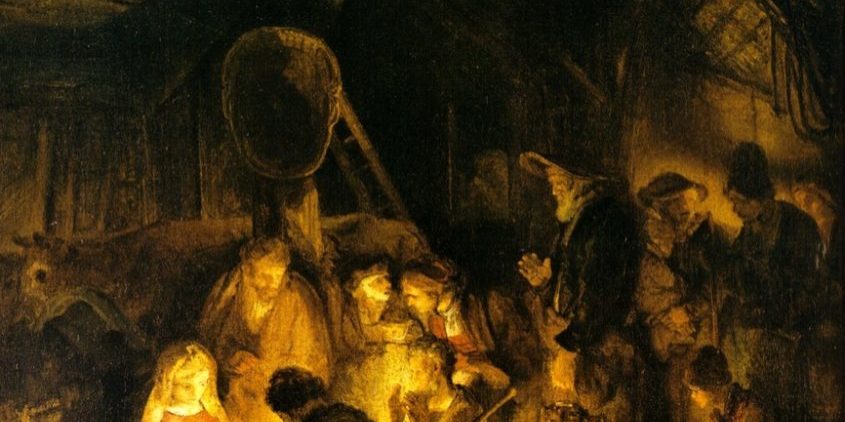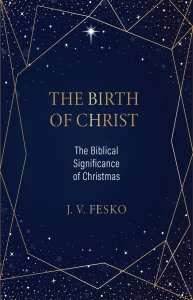
O Come, O Come, Emmanuel
In Israel’s earliest days, God brought them out of Egypt, made a covenant with them, and began to lead them to the land of promise—the land that He had sworn to give to Abraham and his descendants (Gen. 15:18–21). Israel, of course, was a cantankerous nation and lacked the faith to enter the promised land, to believe in the gospel promise of God (Heb. 3:18–4:2).
Mourning in Lonely Exile
 When Israel finished their forty-year wandering and stood at the threshold of the promised land, it was undoubtedly a time of excitement and hope. They were at last going to enter the land promised to their patriarch Abraham so long ago. On the eve of their entry into the land, Moses wrote an inspired prophetic song. This song was filled with praises for their covenant Lord, but at the same time foretold of Israel’s future disobedience and sin (Deut. 32:20–24). Israel sadly fulfilled these words and was carried into exile because of their sin, idolatry, and rebellion. The Northern Kingdom was taken away by the Assyrians in the eighth century BC, and the Southern Kingdom of Judah was taken into captivity by the Babylonians in the sixth century BC.
When Israel finished their forty-year wandering and stood at the threshold of the promised land, it was undoubtedly a time of excitement and hope. They were at last going to enter the land promised to their patriarch Abraham so long ago. On the eve of their entry into the land, Moses wrote an inspired prophetic song. This song was filled with praises for their covenant Lord, but at the same time foretold of Israel’s future disobedience and sin (Deut. 32:20–24). Israel sadly fulfilled these words and was carried into exile because of their sin, idolatry, and rebellion. The Northern Kingdom was taken away by the Assyrians in the eighth century BC, and the Southern Kingdom of Judah was taken into captivity by the Babylonians in the sixth century BC.
Over the centuries there have been millions of people displaced by war—exiled from their home countries. Yet Israel’s exile in Babylon was unique. Israel was the only nation on the face of the earth with whom God had made a covenant. God gave Israel, His firstborn son (Ex. 4:22), a fruitful land flowing with milk and honey, a land marked by God’s very own presence as in the garden-temple of Eden. God gave Israel, His firstborn son, a fruitful land flowing with milk and honey, a land marked by God’s very own presence as in the garden-temple of Eden. Click To TweetIn the same way that God once walked with Adam—also His firstborn son (Luke 3:38)—in the beautiful garden-temple (Gen. 3:8), so too God walked with Israel in the promised land by His presence in the tabernacle (Lev. 26:11–12; 2 Sam. 7:6). Yet, like Adam before them, Israel sinned and broke God’s covenant.
Again like Adam, Israel was exiled from the presence of God. They were banished to Babylon, longing for God’s presence, longing for God to redeem them, to ransom them from their captivity. However, the faithful remnant did not desire merely to return to the land but ultimately for God to dwell once again in their midst (Ps. 137:1–4). Yet, as Israel sat in exile by the waters of Babylon, there was still hope—a hope of redemption. Many undoubtedly looked to the prophetic words of Isaiah: “Behold, the virgin shall conceive and bear a Son, and shall call His name Immanuel” (Isa. 7:14). There was a coming child, One who would save Israel—the Lord’s presence in the flesh. In this regard we should note that the word Immanuel, or Emmanuel, means, “God with us.”
Perhaps now we have a better idea of what lies behind the first two verses of this hymn:
O come, O come, Emmanuel,
And ransom captive Israel,
That mourns in lonely exile here,
Until the Son of God appear.Emmanuel, means, “God with us.” Click To Tweet
Rejoice! Rejoice! Emmanuel
Shall come to thee, O Israel.
O come, O come, Thou Lord of might,
Who to Thy tribes, on Sinai’s height,
In ancient times didst give the law
In cloud and majesty and awe.
In these verses the hymn recounts the faithful remnant in exile in Babylon, longing and looking for the birth of their Savior. This desire is couched in terms of the biblical theme of the eschatological exodus, evident in the connection between Israel’s exile in Babylon and the exodus from Egypt by reference to God’s presence on Sinai.
The Shoot of Jesse and Key of David
The prophet Isaiah, however, had much more to say about this coming Savior. Many Old Testament saints knew that the coming Savior would be from the line of David (2 Sam. 7:12–13). However, the nation would be in ruin, the temple—God’s dwelling place—would be razed to a pile of rubble, and it would seem as though David’s line was cut off. Unlike Israel’s wicked kings, even unlike King David, this future King would be personally, perpetually, and perfectly holy and righteous. Click To TweetOnce again, Isaiah prophesied, “There shall come forth a Rod from the stem of Jesse, and a Branch shall grow out of his roots” (Isa. 11:1). Isaiah likens the Davidic dynasty to a stump—the great oak of David’s kingdom that once vaulted into the heavens was cut to the ground and seemingly all but destroyed. Yet, from this stump a shoot would go forth—and this shoot would bear much fruit. Unlike Israel’s wicked kings, even unlike King David, this future King would be personally, perpetually, and perfectly holy and righteous (vv. 2–5).
Elsewhere in Isaiah’s prophecies, there was an oracle of judgment against Jerusalem and especially her king, who relied too much on other nations rather than on the Lord. Isaiah prophesied that God would raise an insignificant servant to care for the house of David, Eliakim, the son of Hilkiah:
The key of the house of David
I will lay on his shoulder;
So he shall open, and no one shall shut; And he shall shut, and no one shall open.
(Isa. 22:22)
Yet Eliakim pointed forward to the greater Servant, to the One who would possess the key of the house of David. We read in the book of Revelation:
And to the angel of the church in Philadelphia write,
“These things says He who is holy, He who is true, ‘He who has the key of David, He who opens and no one shuts, and shuts and no one opens.’” (3:7)
The apostle John applies this Isaian title to Jesus. Jesus is the one, of course—the Son of David, the Son of God—who would come and rule Israel. Faithful Israelites undoubtedly longed and looked for the birth of this child, the One who would hold the key of David. This Isaian theme of the Davidic key appears in the fifth verse of the hymn:
O come, Thou Key of David, come
And open wide our heavenly home;
Make safe the way that leads on high,
And close the path to misery.
Notice once again the theme of the exodus, as it is the Davidic descendant who will make safe the way that leads on high—the pilgrimage to the New Jerusalem, the fulfillment of the shadow of the promised land.
Dayspring from on High
Though hundreds of years passed from Isaiah’s day, seemingly little had happened to address Israel’s exilic mourning. Yes, Israel had returned from exile—Cyrus, the Persian king, led Israel back to the land and permitted them to rebuild the temple (Isaiah 45; Ezra 1). Israel left Babylon on an exodus-like journey that returned them to the land of their forefathers (Isa. 42:16; 48:21; 49:10; Ex. 13:21–22; 15:13, respectively).
Yet, even though the temple had been rebuilt, the faithful remnant knew that their return to the land was not the great divine visitation for which they longed, hoped, and prayed. In fact, when the temple was rebuilt, Israel wept rather than rejoiced. The prophet Haggai lamented: “Who is left among you who saw this temple in its former glory?Haggai’s sight was not exhausted by the lackluster temple that stood before him; he looked to the horizon with hope. Click To Tweet And how do you see it now? In comparison with it, is this not in your eyes as nothing?” (Hag. 2:3). But Haggai’s sight was not exhausted by the lackluster temple that stood before him; he looked to the horizon with hope: “‘The glory of this latter temple shall be greater than the former,’ says the LORD of hosts. ‘And in this place I will give peace,’ says the LORD of hosts” (v. 9). So, then, Israel was still looking for a greater day, one that looked beyond this provisional return to the land. That day would come hundreds of years later.
On the heels of the birth of John the Baptist, John’s father, Zacharias, prophesied of the Messiah who would soon appear (Luke 1:67–79). Zacharias likens the coming Messiah—the descendant of David, the One who would deliver Israel from her enemies, who would be righteous, who would bring the forgiveness of sins and light to those who sat in darkness—to the sunrise, or Dayspring, from on high (v. 78). In other words, he likens the coming Messiah to the rising sun shining light upon the dark world (see also John 1:1–5). The birth of the Savior was the means by which God would liberate His people from the powers of Satan, sin, and death. The birth of the Savior was the means by which God would liberate His people from the powers of Satan, sin, and death. Click To TweetAnd, hence, we find the following in the fourth verse of the hymn:
O come, Thou Dayspring from on high,
And cheer us by Thy drawing nigh;
Disperse the gloomy clouds of night,
And death’s dark shadows put to flight.
God with Us
Emmanuel, God with us, did come to Israel. God fulfilled His promises that He made long ago, not just through the prophet Isaiah but even to our very first parents, Adam and Eve. God promised Adam and Eve that the Seed of the woman would overcome the seed of the serpent (Gen. 3:15). Ever since then, God’s faithful had been looking for the birth of their Savior. When Jesus was born, God finally answered the prayers of His people. He had finally fulfilled His long-awaited promise (see Luke 2:4–14). Here was the son of David, the Lord, the One who would deliver His people from their sin.
The above excerpt is from J. V. Fesko’s new book, The Birth of Christ: The Biblical Significance of Christmas (Reformation Heritage, 2022). Used by Permission.

